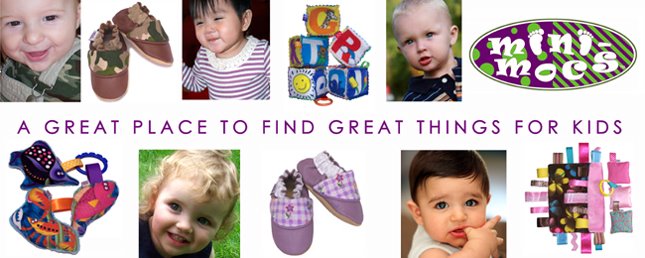Winner will be posted & notified by facebook message on February 5, 2011
Persuading the Gift of Gab...
 Although most babies will start with cooing, that leads to babbling, that turns into talking by the time they are toddles, some of them need a little persuading.
Although most babies will start with cooing, that leads to babbling, that turns into talking by the time they are toddles, some of them need a little persuading. A child’s ability to comprehend doubles by the time they are 18 months old and their vocabulary expands every day. Your time and encouragement are important for give your toddler the confidence and a desire to develop a more involved form of communication.
Tips for encouraging a little chatter…
Touch and say the name of everything you and your toddler come in contact with… ie: crib, toy, table, chair, door etc.
When babies “babble” they know what they are saying… this makes your vocal responses along with lots of direct eye contact & smiles very important. Your vocal responses give your child the confidence to continue communicating with sounds as they develop their lingual skills.
Until baby learns how to say words correctly try not to correct them but instead simply say the word again in a cheerful manner. Including colors and numbers in when saying words can help increase vocal skills. ie: red apple, green grass, two shoes etc…
 You can build their verbal confidence even more by helping your child to understand the meaning of what they are saying. Examples of this would be giving your child a towel from the dryer and saying “warm towel” while they are touching it or a bottle from the fridge and saying “cold milk” while they are taking a drink. You can use this method to teach opposites as well, such as “big and little”, “empty and full” and up and down.
You can build their verbal confidence even more by helping your child to understand the meaning of what they are saying. Examples of this would be giving your child a towel from the dryer and saying “warm towel” while they are touching it or a bottle from the fridge and saying “cold milk” while they are taking a drink. You can use this method to teach opposites as well, such as “big and little”, “empty and full” and up and down.When you give choices verbally rather than holding items for your child to pick from you encourage verbal responses. Ask them “would you like an apple or an orange?” and then wait for the vocal response. You should not give more than 2 choices. You may have to repeat the questions a couple of times. Always use a happy tone in your voice.
 As your child is learning words, mispronunciation or using the wrong word for an object is normal and should not become a focus for correction. Too much correction can be frustrating for your child and can result in a child’s vocal development slowing.
As your child is learning words, mispronunciation or using the wrong word for an object is normal and should not become a focus for correction. Too much correction can be frustrating for your child and can result in a child’s vocal development slowing.
Most importantly remember that every child develops at a different pace. Comparing your child’s vocal skills to that of another may only cause unnecessary concern. Developmental concerns should always be addressed with your child’s pediatrician.
Written by: Annie Boyer, CCD / CEO of Mini-Mocs, Inc.*This article was written using information gathered while doing research on the Internet. Prior to implementing any of these recommendations you should consult your child's pediatrician.
_________________________________________________________________________________
ITALIAN TRANSLATION
Incoraggiare l’eloquenza...
 Sebbene la maggior parte dei bambini inizia con la lallazione, che porta alle prime paroline balbettate, che si trasforma in seguito nella vera e propria espressione linguistica dal momento che sono piccolini, alcuni di loro potrebbero avere bisogno di un po’di persuasione.
Sebbene la maggior parte dei bambini inizia con la lallazione, che porta alle prime paroline balbettate, che si trasforma in seguito nella vera e propria espressione linguistica dal momento che sono piccolini, alcuni di loro potrebbero avere bisogno di un po’di persuasione.
La capacità di apprendimento di un bambino raddoppia dai 18 mesi e il loro vocabolario si espande ogni giorno di più. Il vostro tempo e l’ incoraggiamento sono importanti per dare al vostro bambino la fiducia e il desiderio di sviluppare una forma più completa di comunicazione.
 Sebbene la maggior parte dei bambini inizia con la lallazione, che porta alle prime paroline balbettate, che si trasforma in seguito nella vera e propria espressione linguistica dal momento che sono piccolini, alcuni di loro potrebbero avere bisogno di un po’di persuasione.
Sebbene la maggior parte dei bambini inizia con la lallazione, che porta alle prime paroline balbettate, che si trasforma in seguito nella vera e propria espressione linguistica dal momento che sono piccolini, alcuni di loro potrebbero avere bisogno di un po’di persuasione.La capacità di apprendimento di un bambino raddoppia dai 18 mesi e il loro vocabolario si espande ogni giorno di più. Il vostro tempo e l’ incoraggiamento sono importanti per dare al vostro bambino la fiducia e il desiderio di sviluppare una forma più completa di comunicazione.
Consigli per favorire un po’ di chiacchiere ...
Toccate e pronunciate il nome di tutto ciò con cui voi e il vostro bambino venite in contatto ... vale a dire ad esempio: lettino, giocattoli, tavolo, sedia, porta, ecc...
 Leggete storie al vostro bambino sin da piccolo. Questo lo aiuterà a sviluppare una comprensione delle emozioni e a parlarne. Le Inflessioni della voce sono fondamentali per contribuire a stimolare lo sviluppo dicomunicare con successo.
Leggete storie al vostro bambino sin da piccolo. Questo lo aiuterà a sviluppare una comprensione delle emozioni e a parlarne. Le Inflessioni della voce sono fondamentali per contribuire a stimolare lo sviluppo dicomunicare con successo.Quando i bambini "balbettano" sanno cosa stanno dicendo ... questo rende le vostre risposte vocali, insieme al contatto visivo diretto e ai sorrisi molto importanti. Le vostre risposte vocali danno al bambino la fiducia per continuare a comunicare per sviluppare le proprie competenze espressive.
Fino a quando il bambino non impara a pronunciare bene, non provate a correggerlo ma semplicemente ripetete la parola di nuovo con allegria.
 Includere i colori e i numeri nelle parole da dire può aiutare ad aumentare l’ampiezza linguistica, vale a dire: mela rossa, verde prato, due scarpe, ecc ...
Includere i colori e i numeri nelle parole da dire può aiutare ad aumentare l’ampiezza linguistica, vale a dire: mela rossa, verde prato, due scarpe, ecc ...
È possibile aumentare la loro confidenza verbale, aiutando il bambino a comprendere il significato di ciò che sta dicendo. Esempi di questo tipo sono, dare al vostro bambino un asciugamano appena ritirato dall’asciugatrice e dire "asciugamano caldo", oppure toccare una bottiglia presa dal frigo e dire "latte freddo", mentre lo beve. È possibile utilizzare questo metodo per insegnare opposti , come "grande e piccolo", "vuoto e pieno", e “su e giù”.
Chiedere di prendere una decisone piuttosto che invitare ad una partecipazione passiva, incoraggia il bambino a dare risposte verbali. Chiedete a loro "desideri una mela o un'arancia?" E poi attendete la risposta vocale. Non si dovrebbe dare più di 2 opzioni. Potrebbe essere necessario ripetere le domande un paio di volte. Utilizzate sempre un tono di voce felice .
E’ importante ricordare che ogni bambino si sviluppa con un ritmo diverso. Confrontare le capacità verbali di un piccino a quella di un altro può solo provocare inutili preoccupazioni. Tali preoccupazioni per lo sviluppo verbale dovrebbero essere comunque sempre affrontate con il pediatra di vostro figlio.
Scritto da: Annie Boyer, CCD / CEO di Mini-MOCS, Inc.
* Questo articolo è stato scritto utilizzando le informazioni raccolte durante ricerche su Internet. Prima di mettere in atto qualsiasi di queste raccomandazioni è necessario consultare il pediatra del bambino.
















i primi mesi sono fondamentali per la crescita dell'individuo!! oltre a una buona figura materna e ad una paterna....anche un bel paio di mini mocs ai piedini sono il miglior alleato per lo sviluppo!!
ReplyDeleteVery interesting! Sadie has a pretty good sized vocabulary so we have to spell around her. She can even tell time and also tell the difference between lounge pants and workout pants since those mean walks! :)
ReplyDelete